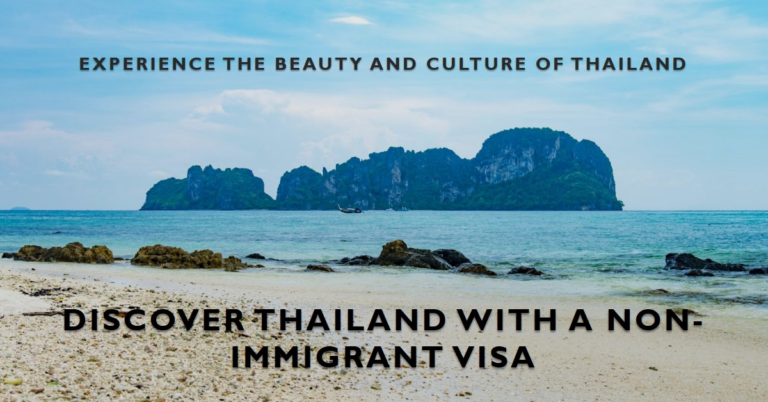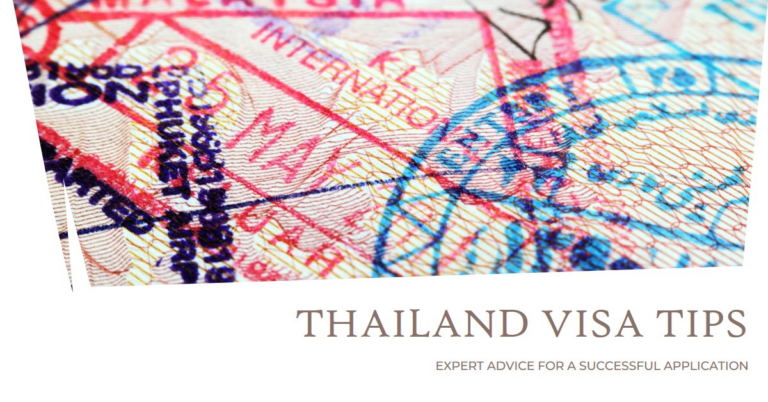
Ultimate Guide to Thailand Visas in 2024 – 2025
The ultimate guide to Thailand Visas 2024 – 2025. Thailand, renowned for its stunning beaches, vibrant culture, and delectable cuisine, remains a top destination for global travelers. Whether you’re planning a brief getaway, an extended stay, or contemplating retirement in Thailand, understanding the intricacies of visa requirements is paramount. This comprehensive guide provides everything you need to know about Thailand visas in 2024, ensuring you’re thoroughly prepared for your journey.
Table of Contents
- Overview of Thailand Visas
- Tourist Visas
- Tourist Visa (TR)
- Visa Exemption
- Visa on Arrival (VOA)
- Non-Immigrant Visas
- Non-Immigrant Visa “B” (Business)
- Non-Immigrant Visa “ED” (Education)
- Non-Immigrant Visa “O” (Other)
- Non-Immigrant Visa “O-A” and “O-X” (Retirement)
- Special Long-Term Visas
- Thailand Elite Visa
- Smart Visa
- Extension and Renewal of Visas
- Tips for Visa Applications
- Common Questions about Thailand Visas
- Conclusion
1. Overview of Thailand Visas
Thailand offers a diverse array of visas tailored to different purposes and durations of stay. From short-term tourist visas to long-term options for retirees and digital nomads, selecting the appropriate visa type aligns with your specific plans. The Royal Thai Embassy and Consulates serve as the primary venues for visa applications, with extensions possible for certain visas within Thailand.
2. Tourist Visas
Tourist Visa (TR)
Ideal for stays between 30 to 60 days, the Tourist Visa (TR) can be extended once for an additional 30 days.
Key Points:
- Validity: 60 days
- Extension: 30 days (apply at Thai Immigration Office)
- Requirements: Passport, completed visa application form, recent photograph, proof of financial means, travel itinerary, and accommodation details.
Visa Exemption
Citizens of 64 countries, including the US, UK, Canada, and most EU countries, can enter Thailand visa-free for tourism purposes for up to 30 days, extendable by another 30 days locally.
Key Points:
- Validity: 30 days
- Extension: 30 days (apply at Thai Immigration Office)
- Requirements: Passport valid for at least 6 months, return/onward travel ticket, proof of sufficient funds.
Visa on Arrival (VOA)
Available to citizens of 19 countries, including India and China, for stays of up to 15 days upon arrival.
Key Points:
- Validity: 15 days
- Extension: Not extendable
- Requirements: Passport, completed VOA application form, recent photograph, return/onward travel ticket, proof of accommodation, and financial means.

3. Non-Immigrant Visas
Non-Immigrant Visa “B” (Business)
Designed for individuals conducting business, attending meetings, or working in Thailand.
Key Points:
- Validity: 90 days (single-entry) or 1 year (multiple-entry)
- Extension: Possible within Thailand for up to 1 year
- Requirements: Passport, completed visa application form, recent photograph, letter of invitation from a Thai company, proof of financial means, and additional documents based on business activities.
Non-Immigrant Visa “ED” (Education)
For those pursuing education in Thailand, including language courses, university degrees, and other academic programs.
Key Points:
- Validity: 90 days (initially), extendable to 1 year
- Extension: Renewable annually based on course duration
- Requirements: Passport, completed visa application form, recent photograph, acceptance letter from an educational institution, and proof of financial means.
Non-Immigrant Visa “O” (Other)
Covers various purposes such as visiting family, volunteering, or attending to Thai dependents.
Key Points:
- Validity: 90 days (single-entry) or 1 year (multiple-entry)
- Extension: Possible within Thailand for up to 1 year
- Requirements: Passport, completed visa application form, recent photograph, supporting documents related to the purpose of stay, and proof of financial means.
Non-Immigrant Visa “O-A” and “O-X” (Retirement)
Tailored for retirees wishing to spend extended periods in Thailand.
Key Points:
- Non-Immigrant Visa “O-A”: Valid for 1 year, renewable annually
- Non-Immigrant Visa “O-X”: Valid for 10 years (5+5 years), available to citizens of 14 countries
- Requirements: Passport, completed visa application form, recent photograph, proof of financial means (income or bank statement), medical certificate, and police clearance certificate.
4. Special Long-Term Visas
Thailand Elite Visa
Part of Thailand’s Privilege Card Program offering extended residency options with exclusive benefits.
Key Points:
- Validity: 5, 10, or 20 years (depending on package)
- Benefits: VIP services, airport fast-track, discounts, and exclusive events
- Requirements: Membership fee (THB 500,000 to THB 2,000,000), passport, completed application form, and recent photograph.
Smart Visa
Geared towards attracting skilled professionals, investors, and startup entrepreneurs in targeted industries.
Key Points:
- Validity: Up to 4 years
- Benefits: No work permit required, residency eligibility for spouse and children
- Requirements: Passport, completed visa application form, recent photograph, qualifications proof, employment contract or business plan, and approval from Thailand’s Board of Investment (BOI).
5. Extension and Renewal of Visas
Extending or renewing visas in Thailand is straightforward with proper preparation and meeting necessary criteria. Applications can be processed at local immigration offices, ideally before the current visa expires.
General Steps for Visa Extension:
- Visit the Immigration Office: Locate the nearest Thai Immigration Office.
- Submit Documents: Provide necessary documents including passport, application form, and supporting documents.
- Pay the Fee: Pay the visa extension fee (typically THB 1,900).
- Receive Extension: Await processing and receive visa extension.
Common Documents Required:
- Passport: Valid with at least 6 months remaining.
- Application Form: Completed visa extension form.
- Photograph: Recent passport-sized photo.
- Proof of Financial Means: Bank statements or financial proof.
- Additional Documents: Depending on visa type, additional documents like invitation letters, proof of residence, or educational certificates may be necessary.

6. Tips for Visa Applications
Successfully obtaining a Thai visa requires meticulous attention to detail and thorough preparation. Consider these tips to streamline your application process:
- Begin Early: Initiate visa applications well ahead of intended travel dates to accommodate processing times and address potential issues.
- Review Requirements: Thoroughly understand specific visa prerequisites based on nationality, purpose of visit, and other relevant factors.
- Document Accuracy: Ensure all documentation is precise, complete, and up-to-date to avoid delays or rejection.
- Financial Adequacy: Demonstrate sufficient financial capability to support your stay in Thailand with bank statements, income proof, or sponsorship letters.
- Health Coverage: Certain visas may necessitate health insurance coverage, so verify requirements pertinent to your visa category and secure suitable insurance.
- Follow-Up: If responses are delayed beyond expectations, follow up with the respective embassy or consulate for application status updates.
7. Common Questions about Thailand Visas
Q1. Can I work in Thailand on a tourist visa? A: No, working in Thailand on a tourist visa is illegal. A Non-Immigrant Visa “B” and work permit are mandatory for legal employment.
Q2. How can I convert a tourist visa to a long-term visa? A: Typically, converting a tourist visa to a long-term visa necessitates departure from Thailand and application for the appropriate visa at a Thai embassy or consulate overseas.
Q3. What are the consequences of overstaying my visa? A: Overstaying may result in fines, deportation, and inclusion on Thailand’s blacklist, barring re-entry. It’s essential to extend or renew visas before expiry.
Q4. Can the Visa on Arrival (VOA) be extended? A: No, the Visa on Arrival isn’t extendable. Depart Thailand before the VOA expires, re-entering with a fresh visa if required.
Q5. Can I apply for a Thai visa online? A: Certain Thai embassies and consulates offer e-visa services for specific visa types. Verify availability and procedures with the respective embassy or consulate.
8. Conclusion
Ultimate Guide to Thailand Visas in 2024 – 2025 helps you navigating Thailand’s visa landscape might seem daunting initially, yet with comprehensive information and careful planning, the process becomes manageable. Whether you’re embarking on a brief vacation, conducting business, or contemplating a long-term residence, selecting the appropriate visa category is crucial. Ensure adherence to all stipulations, compile accurate documentation, and submit applications well in advance of travel dates.
Thailand’s diverse visa options accommodate various needs, making it accessible for tourists, business professionals, students, retirees, and digital nomads alike. Referencing this guide equips you with essential knowledge for a fulfilling experience in the Land of Smiles.
Please note, while this guide reflects 2024 regulations accurately, visa policies may change. For the latest information, consult official Thai immigration authorities or the nearest Thai embassy/consulate or a local visa agent.
Wishing you delightful travels and a warm welcome to Thailand!